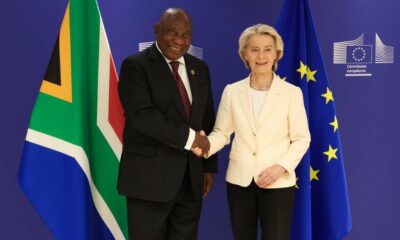News
Hijacked by the Suits: How Consultants Are Profiting From South Africa’s Climate Crisis

Instead of helping communities, billions in climate funds are cycling through boardrooms, not backyards.
That’s the uncomfortable truth laid bare in a new report from accountability watchdog Open Secrets, which investigates how private consulting firms, many with ties to fossil fuel giants are cashing in on South Africa’s just energy transition.
The report, titled Profiting From the Crisis, exposes how management consultancies like Boston Consulting Group (BCG), McKinsey, Bain, and Big Four audit firms are absorbing the bulk of international donor grants meant to help South Africa transition away from coal, while many local organisations, communities, and public institutions are left on the sidelines.
Follow the Money: The Donors, the Deals, and the Detours
South Africa was promised $12.8 billion by wealthy nations to help fund its climate transition, of which $2.8 billion has been formally committed to projects. But Open Secrets says much of that money never really lands on the ground.
Instead, it “passes through” the South African state, ending up in the hands of multinational consultancies or institutions linked to donor countries themselves.
“Sixty-five percent of committed grant funds go to private consulting firms,” lead investigator Zen Mathe revealed at a recent forum. “Less than 25% makes it to local institutions, NGOs or the public sector.”
The Usual Suspects: Fossil Fuel Ties and Conflicts of Interest
BCG, one of the report’s primary targets, brands itself as a global climate leader. But Open Secrets says the firm has deep ties to some of the world’s worst polluters, including Saudi Aramco, Shell, ExxonMobil, and Sasol the latter a South African industrial polluter BCG continues to consult.
Despite these links, BCG has played central roles at COP26, COP27, and COP28, major global climate summits even while lobbying for clients in direct conflict with climate goals.
“BCG praises fossil fuel companies for ‘innovation’,” the report notes. “Yet many of those companies continue to double down on carbon-heavy business models.”
BCG raked in $1.1 billion from climate consulting in 2021 alone, with forecasts suggesting it could make up a third of its sales by 2027.
Meanwhile, McKinsey and Deloitte also continue to advise fossil fuel companies, even as they benefit from South Africa’s green transition grants. Both firms have also been implicated in state capture scandals, raising red flags about their continued involvement.
Public Resources, Private Power
At the core of Open Secrets’ argument is a warning about democracy and accountability.
“The use of consulting firms to shape climate policy is a massive risk,” said legal head Ariella Scher. “It sidelines the public and undermines South Africa’s own institutions.”
The report notes that some of the most critical decisions on climate adaptation and funding are made behind closed doors, without transparency or public input. That includes decisions that shape how donor funds are spent, who benefits, and what gets built, if anything.
“We’re watching the climate transition being corporatised,” said Mathe. “It’s the same people who’ve always controlled the economy, only now they’re cashing in on a new crisis.”
Where Are the Communities in the ‘Just Transition’?
The very idea of a “just” energy transition is that no one, especially vulnerable coal-dependent communities, gets left behind. That’s now codified under South Africa’s Climate Change Act, which calls for low-carbon development that creates decent work, protects the vulnerable, and builds equity.
But the reality, says Open Secrets, is that the most powerful continue to benefit, while poor and working-class communities are left out of decision-making and funding.
“Climate justice means more than cutting emissions,” said Scher. “It means fixing inequality. Right now, that’s not happening.”
What Needs to Change?
Open Secrets is calling for a massive overhaul in how climate funds are managed:
-
Funds should be channelled through South African public institutions, not global consultants.
-
Spending must be in line with the Public Finance Management Act (PFMA) ensuring parliamentary oversight.
-
All projects and grant disbursements should be tracked in a publicly accessible database.
-
Greater regulation is needed to scrutinise the role of consulting firms and prevent conflicts of interest.
Above all, they urge the public to demand transparency, accountability and inclusion.
Climate Colonialism in a New Suit?
In many ways, this story is a cautionary tale of climate colonialism, where aid flows from North to South, but ends up enriching those who sent it in the first place.
The fight for climate justice in South Africa is no longer just about reducing emissions. It’s about who controls the transition, who benefits, and whether the process serves people or simply enriches power.
As Open Secrets warns, South Africa’s climate crisis must not become another feeding trough for global elites.
BCG, McKinsey, Sasol, and Deloitte have denied any wrongdoing. Merely being hired as consultants does not imply misconduct. However, the debate about their role in shaping public policy without public mandate continues to intensify.
{Source: Mail & Guardian}
Follow Joburg ETC on Facebook, Twitter , TikTok and Instagram
For more News in Johannesburg, visit joburgetc.com



























